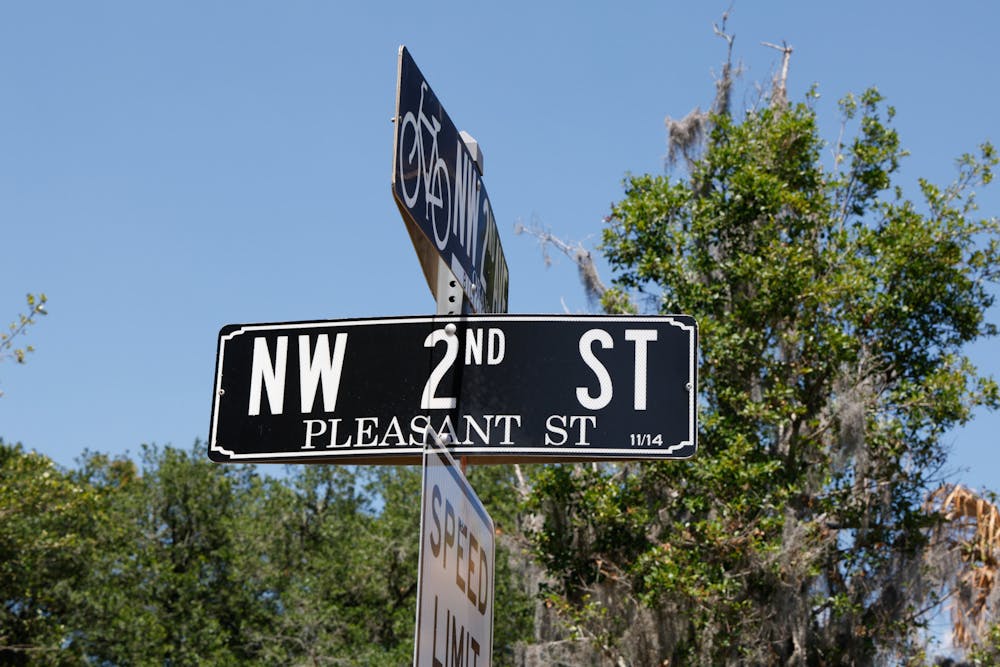Angelica Arbelaez moved to Gainesville in search of its cultural and artistic hub. Twenty years later, she worries Fifth Avenue and Pleasant Street, home to the city’s oldest Black neighborhood dating back to the 19th century, could be at risk of losing the people that make up its living history.
“It’s so valuable to hear from folks that have lived here for centuries,” Arbelaez said.
Originally proposed in the late 20th century, the Fifth Avenue/Pleasant Street Heritage Trail began as a way to commemorate the historical significance of one of Gainesville’s first Black neighborhoods. After decades of little progress, organizers of the project held a community meeting June 5 to gather insight.
The City Commission engaged in an oversight procurement process for the trail in 2023. Ennis Davis and Adrienne Burke, Community Planning Collaborative founders, bidded to take charge of the project and were awarded the contract.
The group aims to begin physically marking the trail early next year, but Burke said the project will be consulted by a group of six Fifth Avenue/Pleasant Street descendants in the meantime.
However, she said the trail’s long-awaited completion is the group’s most pressing concern.
“The community is tired,” Burke said. “They just want to see it get done.”
Burke will consider the initiative a “massive failure” if it doesn’t come to fruition this time.
The trail will consist of a collection of markers placed in historically significant locations between Fifth Avenue and Pleasant Street to celebrate the area’s historic residents in spite of gentrification.
Davis previously worked on multiple projects similar to the Fifth Avenue/Pleasant Street Heritage Trail aiming to preserve different cultural legacies.
“Every community has a unique story,” he said.
Davis and Burke said the project could also serve as an economic benefit to the Gainesville area, referencing the success of heritage trails in other communities including Souls of Frenchtown in Tallahassee and LaVilla in Jacksonville.
“The whole concept of it is helping to share history and stimulate foot traffic to also support a lot of the rehabilitation and existing business in that area,” Davis said.
The trail is critical to ensuring Black history is not forgotten, Arbelaez said. She works with the Gainesville Community Reinvestment Area, a portion of the city dedicated to investing in the preservation of local neighborhoods.
With an increase in gentrification, she said the history of Fifth Avenue and Pleasant Street is dying, making the project valuable even in its planning stages.
“It has come together in different parts of the city to preserve history,” she said.
While Arbelaez expressed approval of the project, other community members believe it’s too late.
Terri Bailey, owner of the Bailey Learning and Arts Collective nonprofit, said her family has lived between Fifth Avenue and Pleasant Street since the 1920s. New developments have since taken over the neighborhood.
“The heritage trail is not a new concept,” she said. “It would’ve been great if we could’ve moved forward with it while there were still a lot of Black people living in our neighborhood, but right now, our neighborhood is extremely gentrified.”
Bailey said she can’t help but see the trail as a memorial of the neighborhood rather than a celebration.
“Most of our families have either lost it due to poor planning in terms of real estate or from taxes or from misrepresentation from development,” she said. “I’m sure African Americans comprise less than 20% of Pleasant Street at this point.”
While the project has been discussed for decades, she said it’s only now being prioritized because the neighborhood has suffered from gentrification, which could make the trail feel like a “poverty tour.”
Bailey volunteered to assist with the project.
The Fifth Avenue/Pleasant Street area has the potential for revitalization through the project, which Jay Nordqvisd, an engineer and Gainesville resident, said could bring back the descendants of its original residents.
“The past is the past and the future is the future,” he said. “We can look at our past and try to learn from it and then move ourselves forward to make the best future we possibly can.”
Contact Morgan Vanderlaan at mvanderlaan@alligator.org. Follow her on X @morgvande.
Morgan Vanderlaan is a second year political science major and a Spring 2025 metro general assignment reporter. She has previously worked on the enterprise desk as a political reporter and on the county and city commission beat. When she's not on the clock she can be found writing, reciting and watching theatre!






